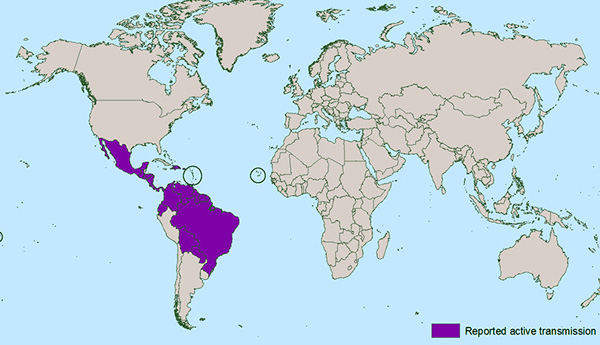- La Feria Community Holds Succesful Business Mixer Event
- Little Nashville to Take Place in Downtown Mercedes
- Lions Basketball Captures District Gold
- La Feria ISD Students Compete in Regional Chess Tournament
- Lions End First Half of 32-4A on a High Note
- La Feria ISD Held Another Successful Parent Conference
- Strong Appearance for Lions at Hidalgo Power Meet
- LFECHS Students Get to Meet Local Actress
- Students Participate in Marine Biology Camp
- Two LFECHS Students Qualify for All-State Band
Texas Officials Report Nine Cases of Zika Virus Infection
- Updated: February 12, 2016
by Mark Richardson

The Zika virus is prevalent in the areas seen in purple, mostly in the Caribbean basin, Central and South America, and southern Mexico. Photo: CDC
AUSTIN, Texas – Public health officials in Texas are reporting nine cases of the Zika virus in the state’s three largest cities. The Department of State Health Services said Tuesday it has confirmed seven cases in the Houston area and one in San Antonio, all persons who recently traveled to countries with a high infection rate.
A single case in Dallas is believed to be the result of sexual transmission. Tom Skinner, spokesman for the Centers for Disease Control and Prevention, says the growing number of Zika cases has his agency moving quickly.
“We activated our emergency operations center, which allows us to pull resources from across CDC, and enhance our ability to respond,” he says. “We are sort of in a full-court press trying to learn as much as we can about Zika virus.”
Skinner says the CDC believes better sanitation conditions in the U.S. will prevent a widespread outbreak here, but also predicts the number of cases will continue to grow.
Zika is almost exclusively spread by infected mosquitoes, though there have been reports of infections through sexual contact. The virus can cause minor flu-like symptoms, but when pregnant women are infected, their babies may be born with severe birth defects.
Texas health officials say they depend on the CDC labs to confirm Zika cases, as the state’s labs don’t yet have that capability. Skinner says CDC staff is working to change that.
“We’re working to improve our ability to diagnose Zika virus infection through laboratory tests,” he says. “There’s only a handful of states that can actually do the kind of testing for Zika to diagnose, so we’re working to enhance the states’ abilities.”
The highest rates of Zika infections have been reported in the Caribbean basin, Central and South America, and southern Mexico. The CDC has issued travel warnings for those areas, particularly for women who are pregnant or are considering becoming pregnant.


